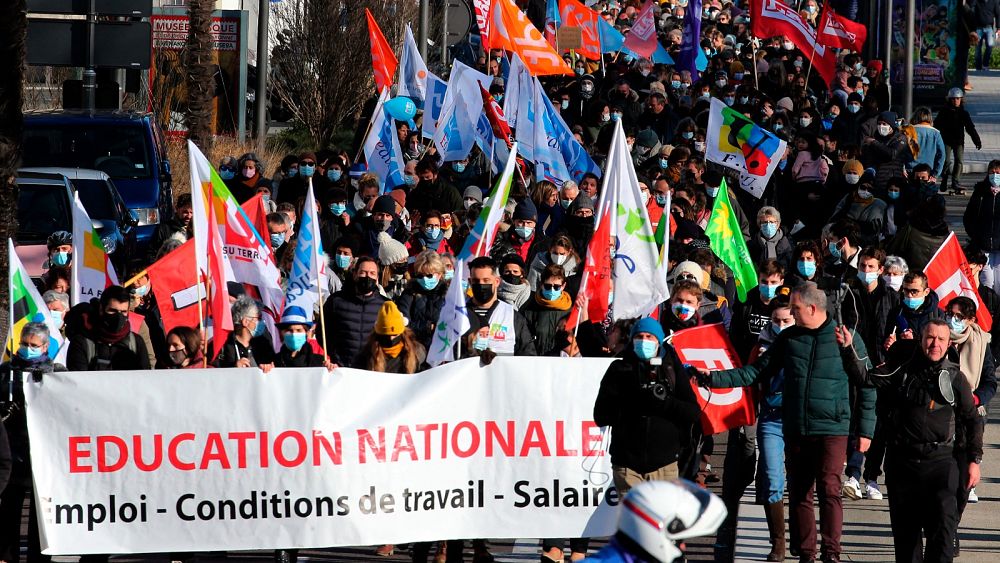
France’s education unions staged a nationwide strike on Thursday, with teachers describing a “catastrophic” situation in schools as tens of thousands of students are out sick with COVID-19.
“We have already changed protocol three times since the start of the school year, so we give different parents information every week, every day,” said Léna Peregrin, a 25-year old teaching assistant who has been responsible for managing the COVID-19 protocol in her school in Lyon.
“We have 52 COVID cases today, we had 30 at the start of the week. It is increasing every day and nothing is changing,” she added.
“We are asking (the government) for the means to make us safe such as masks. The mask that I’m wearing today is the mask that I have been buying for a year because the ministry does not supply us with surgical masks or FFP2 masks.”
One of the largest French education unions, the SNUIPP-FSU, said around 75% of school personnel went on strike, resulting in the closures of around half of schools. The union called it a “historic mobilisation”, adding that it was not a strike against the virus but rather a reflection of growing anger in schools.
France’s education ministry put the number of strikers at a total of 27% of school personnel nationally, with around 40% of personnel in primary schools on strike.
“The strike is historic. There have never been so many strikers in schools for a very long time,” said Benjamin Grandener, a school director and co-secretary of the Rhône chapter of the largest teachers’ union.
“It’s an absolute mess in the schools and even if on paper they’re open, in truth, we’re unable to really teach the students and classes that are present.”
Strikers in Lyon on Thursday took up the space of three streets, with many teachers stating that they were present in anger over the situation and that they were exhausted.
The workers marched through the streets chanting that they wanted masks in schools, as onlookers eating in restaurants and on the street stood up to clap for them. Many teachers carried signs to say they were in distress.
“It really weighs on you. I know when I get home I’m really not well,” said Fidji, a 25-year-old education assistant who started working in a high school just last year.
“We are at the end of the line, we are on edge, it creates tension. Yesterday someone intentionally set a fire in the high school. So, in addition to working to put out the pandemic fire, there was a real fire.”
Two high school teachers in the region of Isère said they were protesting over the “catastrophic” situation in schools.
“The students are dropping like flies in the classes, we only have two school monitors, two out of five working. The school is completely overwhelmed,” one of them said.
A brand new high school exam is planned for March and the teachers say they lack information about the criteria, adding to their stress and to those of the students.
“The high school students are already very stressed by the baccalaureate and with the reform, they have to take speciality exams in March. The tests are coming very quickly and with all the classes they missed or the students not having access to everything that is virtual, they’re not getting quality classes,” said Mégane Montavert, a 30-year-old high school teacher in Lyon.
Parents and teachers learned last week that students in classes where someone has a case of COVID-19 would have to be tested three times a week in order to keep the class open.
There are currently more than 300,000 new COVID-19 infections a day in France, the highest number of daily cases since the beginning of the pandemic.
It’s due to the highly transmissible Omicron variant and has resulted in thousands of school classes being temporarily closed due to COVID.
Vaccination only recently opened to young children, with less than 1% of those under the age of 11 fully vaccinated.
Education unions demand that school personnel and students be equipped with surgical masks and respirators as well as self-tests. They are also urging the government to delay the Baccalaureat to June due to the health crisis.
The government said on Tuesday that more than 10,000 school classes were closed, representing around 2% of primary school classes, but that their goal was to keep schools open.
Ahead of the education strike, Prime Minister Jean Castex said the rules would be simplified, stating that there would be free self-tests available in pharmacies and that three self-tests were sufficient for contacts of people who test positive for COVID-19 in schools.
Education minister Jean-Michel Blanquer said on cable television: “it’s not as if we were in a normal period, we’re in a severe crisis”. He said that people shouldn’t strike against a virus.
The COVID-19 epidemic comes as France prepares for an April presidential election with multiple candidates on both the left and right supporting teachers who are striking against the government.
Managing COVID-19 infections in schools has been a challenge throughout the pandemic, with the World Health Organization’s European regional director stating this week that schools must be the last to close.
“Keeping schools open has important benefits for children’s mental, social and educational well-being. Schools should be the last places to close and the first to reopen,” Hans Kluge said.